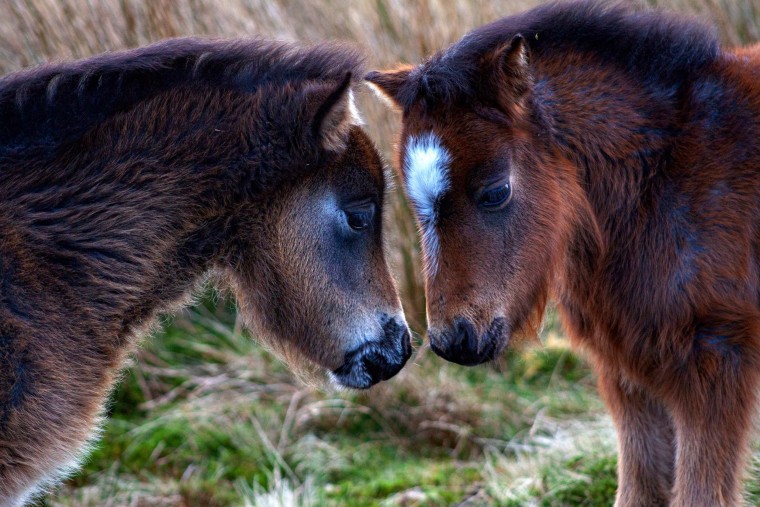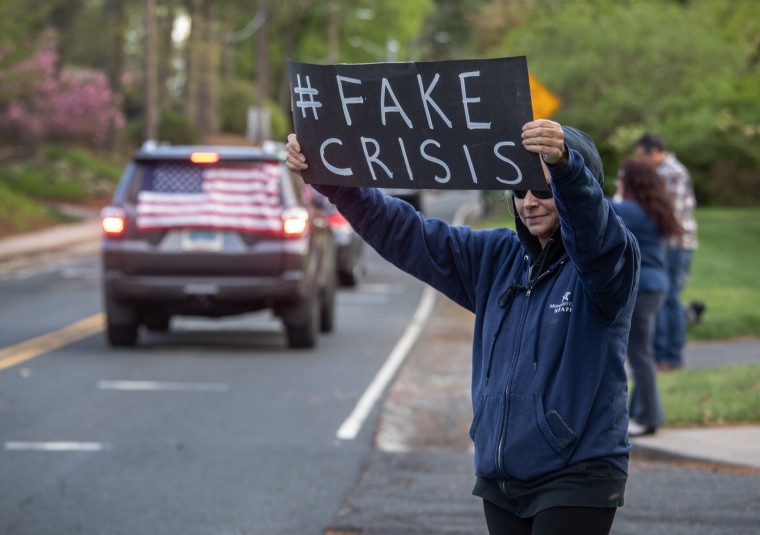Good morning, NBC News readers.
While doctors and hospitals are struggling on the frontlines of the coronavirus pandemic in the United States, South Korea's ability to halt the spread of the virus offers some hope and a glimpse of post-lockdown life.
Here's what we're watching this Thursday morning.
'What are we doing this for?': Doctors are fed up with conspiracies ravaging ERs
Many health care professionals already exhausted by their work treating coronavirus patients say they are dealing with a bombardment of misinformation and harassment from conspiracy theorists, some of whom are pressing doctors for proof of the severity of the pandemic.
And it's taking a toll, NBC News' Ben Collins reports.
Dr. Hadi Halazun, a cardiologist in New York, said dealing with conspiracy theorists is the "second most painful thing I've had to deal with, other than separation of families from their loved one."
Many of the doctors Collins spoke with pin the blame on social media companies for not doing enough to counter the misinformation on their platforms.
"I do think it's a monumental task to hold these companies to account, but in the COVID case, they truly have blood on their hands," said Dr. Duncan Maru, a physician and epidemiologist in Queens, New York.
The doctors' outrage comes as the U.S. death toll related to COVID-19 has surpassed 73,000, according to NBC News' count.
Here are some other developments:
- President Donald Trump made a U-turn on the coronavirus task force, now saying it will continue "indefinitely" with a focus on safety and reopening the country.
- As the economy begins to restart, the Trump administration continues to dismiss the need for robust nationwide testing. The White House press secretary called the notion that every American needs to be tested a "myth" during a briefing on Wednesday.
- And while Trump claims he inherited a "bare" national stockpile when he came into office, former Obama administration officials beg to differ.
- Economists are bracing for more bad news when the weekly unemployment claims report is announced at 8:30 a.m. ET.
- For some of the sickest patients, blood thinners may be linked to reduced COVID-19 deaths, a study published Wednesday suggests.
- Check out our live blog for the latest updates.
- See maps of where the virus has spread in the U.S. and worldwide.
'Apocalyptic': Hospitals are losing millions treating coronavirus and the results could be dire
Hospitals in the United States could lose more than $500 billion in 100 days during the coronavirus pandemic, according to former Veterans Affairs Secretary David Shulkin.
While Congress has appropriated $175 billion in total stimulus funding to hospitals, he said even that amount will not be enough to close the fiscal gap hospitals are facing.
Without proper funding to offset major financial losses during the pandemic, the consequences to major hospitals could be dire.
Large hospitals could begin to see their capabilities and care resources fade, warned Shulkin and others who have served at the helm of major hospitals.
"There is no hospital in the country, I don’t think, that could survive a year of what’s happened in March and April," said Jefferson Health CEO Dr. Stephen Klasko, who also serves as president of Thomas Jefferson University.
Tracking apps and thermal scanners: Life in post-lockdown South Korea
South Korea ended its stringent social distancing policies Wednesday after halting the spread of the coronavirus.
Only two new cases of the virus and one death were reported in South Korea on Wednesday.
Those enviably low infection rates are the result of an aggressive campaign of early detection and tracing — over 1 million tests have been conducted since the first incident of the virus in late January. The result has been a death toll of only 255 people among a population of over 51 million.
But while sports fans will soon be allowed to return to stadiums and museums and libraries began to reopen, life remains far from normal.
Thermal scanners at theme parks, shopping for makeup while wearing masks and constant tracking of people's whereabouts through apps and credit card data are markers of the new post-pandemic world in the country leading the way in its response to the virus.
"Everyday distancing does not mean returning to life before COVID-19," Kim Kang Lip, vice minister of health and welfare, said Tuesday at a news briefing. "It means building new social norms and a culture based on exercising social distancing."
Want to receive the Morning Rundown in your inbox? Sign up here.
Plus
- Video appears to show a black Georgia man being shot while jogging; lawyer calls it a "modern day lynching" and demand arrests.
- K-12 sexual assault investigations will look a lot different under Betsy DeVos' new Title IX rules.
- A woman killed in an alligator attack was manicurist on a house call during South Carolina lockdown.
- "An overdue debt repaid": Irish return centuries-old favor by donating $2 million to Native Americans battling coronavirus.
- One Connecticut teacher is really going the extra mile: She is caring for her students' baby brother as his family recovers from coronavirus.
THINK about it
Michelle Obama controls her own complex narrative in the new Netflix documentary "Becoming," TV and film critic Candice Frederick writes in an opinion piece.
BETTER
Quarantine fatigue and stress is real.Virtual therapy can help.
Shopping
Minimizing your impact on the environment may be easier than you think. Here are the best eco-friendly productsto reduce plastic in the kitchen, according to experts.
One fun thing
Now, how about a story that has nothing to do with coronavirus...
I'll give you one guess on who might be a side beneficiary of the U.K.'s exit from the European Union: Wild ponies.
Driven by a need to diversify, U.K. landowners are embracing "rewilding" — allowing, even encouraging, the return of native plant and animal life to long-changed ecosystems.
That includes short, stout and sturdy wild ponies, among other species.

Thanks for reading the Morning Rundown.
Please send me any comments or questions you have on the newsletter: petra@nbcuni.com
And if you'd like to receive this newsletter in your inbox Monday to Friday, please sign-up here.
Be safe and stay healthy, Petra

